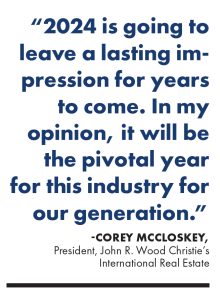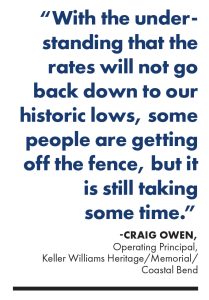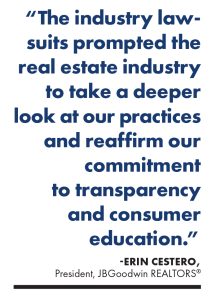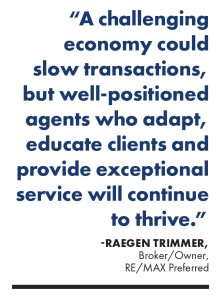The numbers tell the story of residential real estate’s tumultuous year in 2024. Faced with an unprecedented combination of circumstances—from the nearly $1B paid out to settle the Burnett lawsuit to the August 17 mandated rule changes to stubborn inflation, escalating home prices and sparse inventory—it should come as no surprise that the results of RISMedia’s 37th Annual Power Broker Survey reflect a trying year for the nation’s top brokerage firms.
While last year’s Power Brokers reported a more than $3B drop in collective year-over-year sales volume, this year’s Top 1,000 report an increase in sales volume for 2024, despite a slight decrease in transactions, a clear signal of low inventory driving existing prices up.
Assessing year-over-year changes in this year’s Power Broker Report requires a slightly different approach to the math, however. Thanks to ongoing fallout from the commission lawsuits, several of the longstanding leaders in the Power Broker ranking—including Crye-Leike and Carolina One—chose to abstain from the survey in order to protect their firms in this still-litigious environment. Therefore, in order to compare apples to apples, data for these missing firms was subtracted from last year’s totals. The resulting picture is 19,000-plus fewer transactions in 2024 vs. 2023, yet a more than $100B increase in sales volume.
Another important trend evidenced in this year’s Power Broker ranking is residential real estate’s rapid path toward consolidation, a movement that stands to permanently alter the brokerage landscape as we currently know it. Former Top 100 firms, such as @properties Christie’s International Real Estate and Latter & Blum, for example, have been absorbed by Compass, strengthening its hold on the No. 1 spot for the fourth year in a row.
But despite these changes and concerns, which have weighed heavily on real estate professionals, this year’s Power Brokers report optimism for the months ahead as they turn the page on 2024 and move forward with resolve. While for the third year in a row, the largest share of Power Brokers* (37%) describe their market as “Challenged,” 35% describe their market as “Balanced/Healthy,” perhaps a harbinger of better times ahead—but that depends on a lot of “ifs.”
Nagging doubts
Given that the start of the new year was accompanied by the residual effects of industry lawsuits, the dizzying transition to a new administration and a still limping-along economy, Power Brokers started 2025 with a fair degree of concern.
“2024 is going to leave a lasting impression for years to come,” says Corey McCloskey, president of John R. Wood Properties Christie’s International Real Estate in Southwest Florida. “In my opinion, it will be the pivotal year for this industry for our generation. The confusion and misinformation is leading to trust issues with people inside and outside of real estate. The lack of clarity around ways to move forward with all the new rules, forms and technology has created the perfect storm of uncertainty for 2025.”
“The events of 2024—such as industry lawsuits, the election and economic constraints—have created a lingering hangover effect on the real estate market, contributing to slowing sales throughout Q4 2024 and into Q1 2025,” says Dan Kruse, CEO and owner of the Wisconsin-based, multi-state CENTURY 21 Affiliated. He adds, however, that many of these disruptions are now moving into the rearview mirror.

Pete Slaugh, Jr., chairman of Berkshire Hathaway HomeServices Homesale Realty in Pennsylvania agrees, highlighting the effect current issues are having on consumers. “The impact of administration changes are creating uncertainty, especially in areas where there is a high concentration of government workers,” he says. “Too early to tell the whole impact, but certainly we’ve seen some consumer hesitancy in January and February.”
The lawsuits, the new political climate and the economy have indeed taken a toll on all parties involved in the real estate transaction, says Gavin Payne, broker/owner of Better Homes and Gardens Real Estate Haven Properties, serving California’s central coast. “All of the above has caused uncertainty for brokers, agents and, more critically, consumers,” he reports. “This appears to be causing hesitation in some buyers and sellers and a general lack of enthusiasm for the real estate market.”
While the noise surrounding industry lawsuits has died down a bit, according to Tiffany Harris, broker/owner of CENTURY 21 Harris Hawkins & Co., the political climate is causing hesitation among buyers and sellers in the Maryland area, along with high home prices. “Affordability and consumer confidence will make the biggest impact,” she says. “Lack of incentives for first-time homebuyers, paired with higher interest rates, will keep many buyers on the sidelines.”
John DeSouza, president of Cressy & Everett Real Estate, serving the Michiana region, agrees that there are more pressing concerns than the lawsuits, which he believes have moved into the background. “Much instability and unpredictability will slow down our local business community—also, even less new construction starts, further limiting our local inventory,” he says.
Unsurprisingly, mortgage rates continue to be an area of top concern for Power Brokers as they move further into 2025, with last year’s highly anticipated rate drop never coming to fruition.
“After enduring the challenges of high mortgage rates and economic uncertainty in 2023, 2024 showed signs of a repeat performance,” explains Michael Allen, president of CENTURY 21 Jordan-Link & Company in Visalia, California. “While the Federal Reserve finally began reducing the Funds Rate (1% in 2024), the anticipated relief in mortgage interest rates did not materialize, as broader market forces kept rates elevated. Mortgage rates remained a key focus, fluctuating between 6% and 7% for much of the year and finally settling in around 6.7% at the end of Q4. This left many real estate agents and consumers alike mystified.”
 According to Debra Beagle, CEO/managing broker/owner of RE/MAX Advantage in Nashville, Tennessee, buyers are sitting on the fence waiting for rates to come down. “We have four months of inventory and are ready to go,” she reports. “The government needs to address mortgage insurance premiums—reduce or pause collecting on FHA MIP and remove conservatorship of Fannie and Freddie. This will help stimulate affordability for minorities and first-time homebuyers as well as non-traditional W2 buyers.”
According to Debra Beagle, CEO/managing broker/owner of RE/MAX Advantage in Nashville, Tennessee, buyers are sitting on the fence waiting for rates to come down. “We have four months of inventory and are ready to go,” she reports. “The government needs to address mortgage insurance premiums—reduce or pause collecting on FHA MIP and remove conservatorship of Fannie and Freddie. This will help stimulate affordability for minorities and first-time homebuyers as well as non-traditional W2 buyers.”
And while interest rates have been a major contributor to creating hesitancy among homebuyers and sellers, other market dynamics are adding to affordability woes, explains Craig Owen, operating principal at Keller Williams Heritage/Memorial/Coastal Bend in Texas.
“Interest rates have held a lot of people back from buying and selling,” says Owen. “With the understanding that the rates will not go back down to our historic lows, some people are getting off the fence, but it is still taking some time. With the election out of the way, there seems to be some uncertainty, such as the cost of home builds possibly increasing with lower wage laborers not as readily available. The cost of insurance as well as taxes have continued to increase dramatically, which also has a negative effect on the housing market—particularly first-time homebuyers.”
Although the aforementioned concerns about the market are varied, the refrain for 2025 remains the same: There just isn’t enough inventory. For the eighth year in a row, the largest share of Power Brokers (41%)* report a lack of inventory as the No. 1 challenge to business in the year ahead, followed by affordability (19%) and interest rates (18%).
“Interest rates and lack of inventory are proving to be the most difficult for buyers and sellers,” reports Colleen Barry, CEO of Gibson Sotheby’s International Realty in Eastern Massachusetts. “Sellers feel locked into their homes because they don’t want to trade in a low-rate mortgage for a higher one, and buyers simply don’t have a lot to choose from.”
“Interest rates remain stubbornly high, and a lack of inventory weighs on the market,” agrees David Caveness, president and CEO of Carpenter REALTORS® in Indiana. “However, our success relies heavily on our ability to recruit, develop and retain high-quality agents and branch managers. We have made significant advances in agent efficiency/production in the last few years and plan to continue.”
In the Atlanta market, Jamie Mertz, COO, broker/owner and founding partner of Virtual Properties Realty, explains that stalled mortgage rates will have a ripple effect on inventory.
“Mortgage rates might remain elevated, keeping monthly payments high and deterring buyers, particularly in Atlanta’s suburban expansion areas where affordability is key,” she explains. “Sellers may hold onto their homes longer if they have low-interest mortgages, reducing inventory and keeping prices from falling significantly. With buying less affordable, rental demand will likely stay strong, continuing to drive up rents in Atlanta’s booming multifamily sector. Developers may slow new construction if borrowing remains costly, which could tighten supply further.”
Many Power Brokers, however, predict that consumers will become more and more accustomed to the current rates and move forward on their plans to list and buy homes. This, they explain, will help the inventory freeze thaw out as the year progresses.
“We are still experiencing the challenges created by limited inventory, but predict the stall in changes to interest rates will begin to signal the new norm, and sellers who have been waiting will take action,” explains Michael Maloof, president and CEO of Jim Maloof REALTOR® in Illinois.
The power of positive thinking
According to most Power Brokers, succeeding in the year ahead requires accepting reality, then getting busy moving forward.
“The lower number of transactions the industry completed in 2024 impacted everyone in the industry, but top brokerages and top agents find a way to help more customers no matter what the economic conditions are,” says Todd Sumney, chief industry officer for HomeSmart. “Thankfully, our technology, systems and processes enable us to offer extraordinarily high levels of service, tools and resources while adapting to current economic conditions, new industry procedures and requirements and consumer needs—minimizing any negative impacts while empowering and encouraging our brokers and agents.”
A familiar theme in recent times, this year’s Power Brokers reinforce the necessity of embracing change in order to survive—and thrive.
“The events of 2024—industry lawsuits, the presidential election and economic challenges—are certainly significant, but the true impact on the 2025 market will stem from the broader theme of change itself,” says Mary Goudreault, president of Connect Realty Inc., serving 60 markets throughout the U.S. “Change is inherently challenging, and 2024 brought a great deal of it. Those who embrace adaptability will find innovative and productive ways to thrive, while those who resist, will struggle. This holds true for both consumers and professionals within the real estate industry. Success in 2025 will be defined by the ability to navigate these shifts with resilience, creativity and a forward-thinking mindset.”
 Most agree that those brokers and agents who are quick to adapt will set themselves apart in the market and gain an important competitive edge.
Most agree that those brokers and agents who are quick to adapt will set themselves apart in the market and gain an important competitive edge.
“The NAR settlement changes introduced significant challenges for agents, who had to quickly adapt to a new framework for compensation, transparency and negotiation,” says Allen. “These changes required agents to sharpen their communication skills and educate clients on the value of their services in a rapidly evolving landscape. While these shifts initially created uncertainty, they ultimately reinforced the importance of professionalism and trust in the agent-client relationship.”
Many Power Brokers also believe that the disruptive forces of 2024 into 2025 will settle as the year goes on and that market conditions will improve.
“While I don’t expect it to be an extraordinary year, I do see it as a recovery year for most markets—one that will be good, if not great,” says Kruse.
“There is a lot of uncertainty, but it seems most likely, in light of inventory and sales volume picking up steadily in recent weeks (at press time), that our market will experience growth this year,” reports Taylor Chinowth, vice president of Oklahoma’s Chinowth & Cohen REALTORS®. Andrea Larson with Berkshire Hathaway HomeServices MI, Northern IN Real Estate, Tomie Raines, REALTORS® and Executive Realty, says, “We are feeling optimistic across all of our markets, and we believe 2025 is going to be a great year in real estate.”
While uncertainty and upheaval have handcuffed many would-be homebuyers and sellers, Brittney Frietch, broker/owner of BF Realty, sees confidence returning and expects demand to pick up quickly for spring and summer should rates drop. And while affordability remains an issue, she believes that strong, local employment in her Ohio market could keep demand steady.
“In the end, adaptability will be key,” says Frietch. “The agents and brokerages that educate clients, embrace transparency and provide high-value service will be the ones who thrive in this evolving landscape.”
Most brokers agree that success in the year ahead will come down to cutting through the noise, and working on changing consumer perception.
“The industry lawsuits prompted the real estate industry to take a deeper look at our practices and reaffirm our commitment to transparency and consumer education,” says Erin Cestero, president of JBGoodwin REALTORS® in Austin and San Antonio, Texas. “While the settlement has sparked important conversations, we see this as an opportunity to further educate the public and reinforce the professionalism and integrity that define our company. We are proud to continue leading with a client-first approach, demonstrating the advantages of working with a knowledgeable and ethical real estate professional.”
Fundamentals still rule
If there’s one thing that garners consensus among all Power Brokers, it’s that success in real estate ultimately boils down to the age-old formula of skills, knowledge and relationships.
“ events have not impacted our market in a negative way,” says Eddie Valdez, marketing manager with ClearView Realty in El Paso, Texas. “Quite the opposite—agents are getting better at communicating with buyers, taking the time needed to explain and be more detailed, and best of all, sellers are still paying compensation to buyer agents.”
Power Brokers also agree that the new post-lawsuit playing field and market challenges will weed out less-than-serious agents who are unprepared or unwilling to raise the bar on professionalism.
“We believe that there will be a continued exodus of agents that are either untrained, unwilling to learn and grow, or just don’t have the capacity to change,” says Thomas Gallagher, broker/owner of Coldwell Banker American Homes on Long Island, New York.
“I think the effects of the NAR settlement and other related fallout from various lawsuits will have a longstanding effect in our profession,” agrees Shannon Calcines, president of Florida Executive Realty. “Initially, it will be painful as we see agents and brokerages that cannot adapt and ultimately leave the business. Eventually though, I believe this will be good for the profession as it will force agents and brokerages to learn their value, articulate it and then deliver on it—ultimately raising the overall public perception of what we do for our clients every day to that of other highly respected professions.”
According to Jackie Soto, broker/owner of e-homes in California, this year’s market will be a difficult one for real estate professionals who have not laid the groundwork for success.
 “The events of 2024, including industry lawsuits, the presidential election and economic uncertainty, will have an impact on our market in 2025, but the degree of the impact will largely depend on an agent’s ability to adapt,” says Soto. “For those who have not yet built a business foundation that clearly articulates and delivers consistent value to both buyers and sellers, the challenges may be more pronounced. However, for well-established professionals who have built a strong reputation, solid relationships and systems that can pivot in response to market changes, the impact will be less severe. In fact, the ability to navigate uncertainty can create opportunities for those who are proactive, strategic and committed to providing unparalleled service. It’s important to stay focused on adding value, embracing technology and being adaptable, as these factors will determine who thrives in the shifting market.”
“The events of 2024, including industry lawsuits, the presidential election and economic uncertainty, will have an impact on our market in 2025, but the degree of the impact will largely depend on an agent’s ability to adapt,” says Soto. “For those who have not yet built a business foundation that clearly articulates and delivers consistent value to both buyers and sellers, the challenges may be more pronounced. However, for well-established professionals who have built a strong reputation, solid relationships and systems that can pivot in response to market changes, the impact will be less severe. In fact, the ability to navigate uncertainty can create opportunities for those who are proactive, strategic and committed to providing unparalleled service. It’s important to stay focused on adding value, embracing technology and being adaptable, as these factors will determine who thrives in the shifting market.”
Raegen Trimmer, broker/owner of RE/MAX Preferred in Wisconsin, in true Power Broker spirit, also sees opportunity among the disruption.
“A challenging economy could slow transactions, but well-positioned agents who adapt, educate clients and provide exceptional service will continue to thrive,” she says. “We’ll stay ahead of these changes, equipping our agents with the training, strategy and resources needed to navigate the evolving market successfully.”
For the full RISMedia 2025 Power Broker Report, click here.

